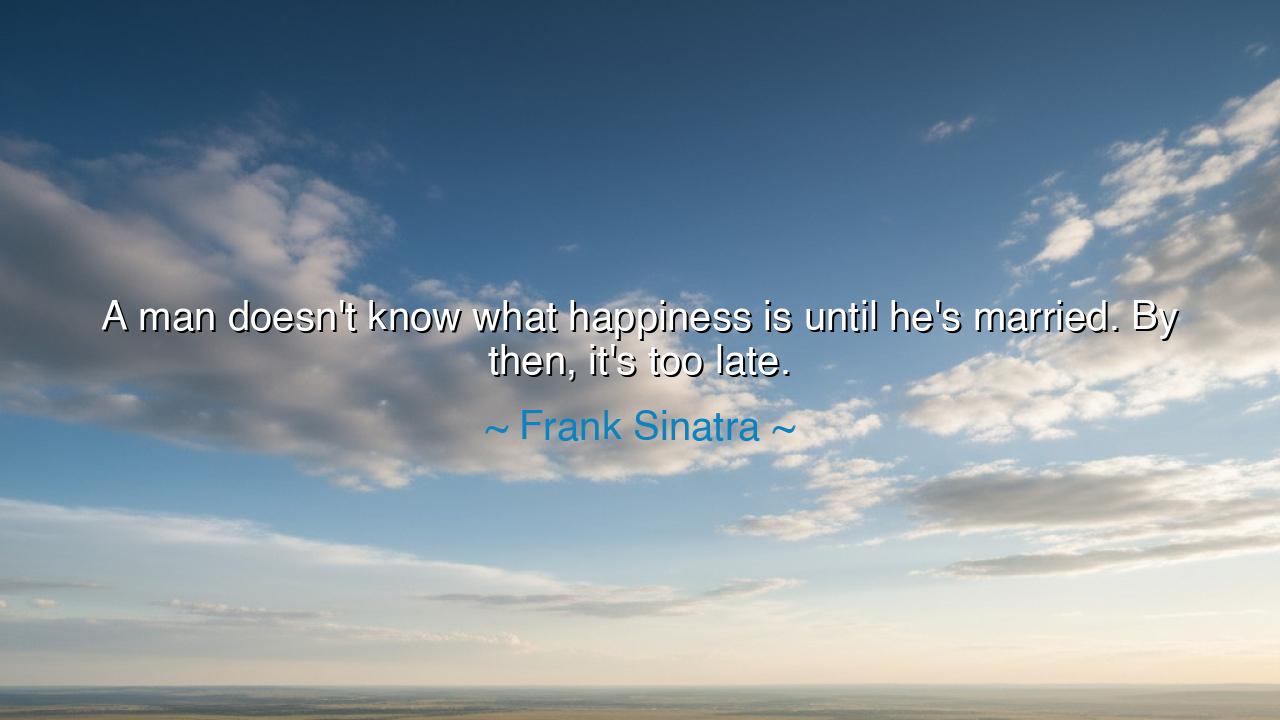
A man doesn't know what happiness is until he's married. By then






“A man doesn’t know what happiness is until he’s married. By then, it’s too late.” Thus quipped Frank Sinatra, the silver-voiced poet of love and longing, whose life was woven with the triumphs and tragedies of the heart. Though cloaked in humor, his words ring with the bittersweet truth that happiness is often recognized only in its passing, and that love, while radiant, carries the shadows of its own complexity. In this jest lies both laughter and lament — the wisdom of a man who knew the heights of romance and the weariness of disillusionment. It is the paradox of human affection: that we dream of love’s joy, but discover its weight only once it rests upon our shoulders.
The meaning of this quote is not merely cynicism, as some might think, but insight into the dual nature of marriage — that sacred bond which brings both comfort and challenge. Before marriage, a man may imagine happiness as freedom: the ability to live as he pleases, unbound and unburdened. Yet when he enters into union, he learns that true happiness demands surrender — of pride, of solitude, of the illusion of self-sufficiency. It is only then that he discovers that joy is not simple; it is made of patience, compromise, and understanding. Sinatra’s jest — “by then, it’s too late” — is the sigh of one who has learned that love is not a song without sorrow, nor a garden without thorns.
The origin of these words lies in Sinatra’s own tumultuous life. A man of passion and contradiction, he was married four times, and his relationships with women were as legendary as his music. He loved deeply, but often uneasily — torn between the romantic ideal and the restless heart. In his humor, we hear not bitterness, but the voice of one who has lived enough to see the comedy in his own longing. His wit masks a deeper truth: that love, in all its beauty, is also a test — a mirror that reveals one’s flaws, and a fire that purifies the soul. Through marriage, we encounter not only another person, but ourselves, stripped of illusion.
History, too, echoes this lesson. Consider Napoleon Bonaparte, who loved Josephine with fiery devotion, yet found in their marriage both ecstasy and torment. He wrote to her with trembling passion, yet their union was haunted by distance and misunderstanding. “I wake full of you,” he once confessed, “your image and the memory of last night’s intoxicating pleasures have left no rest to my senses.” And yet, that same love became a burden, as ambition and fate tore them apart. His happiness, like Sinatra’s jest, was real — but fleeting. Through him we see that even the mighty, when bound by love, are humbled before its mystery.
Yet we must not mistake this saying for despair. Beneath its irony lies an unspoken reverence for the power of love to transform and humble. Sinatra’s humor hides a truth the ancients themselves would have recognized: that no one can truly understand happiness without risk, and no one can experience the fullness of love without surrender. Marriage, in its trials, is the forge of the soul. To enter it is to accept imperfection — one’s own and another’s — and to learn that joy is not the absence of struggle, but the fruit of endurance and tenderness.
To live by this wisdom, one must embrace both the laughter and the lesson. When love seems heavy, do not curse it; when joy fades, do not despair. Remember that happiness is not a steady flame, but a fire kindled and rekindled through devotion. Do not seek perfection in your partner, but growth in yourself. The humor of Sinatra’s words reminds us not to take even our pain too seriously — for love, like life, is best endured with a measure of laughter. The one who can smile through the trials of affection will find that even its sorrows are touched by grace.
The lesson, then, is this: love is both a gift and a crucible. It will exalt you, and it will test you. Do not wait until it is “too late” to recognize its worth. Happiness in marriage — or in any bond of love — does not come from ease, but from the courage to give yourself fully, knowing that in doing so, you may suffer. Yet it is precisely through that surrender that life becomes rich, and the heart, though wounded, becomes wise. So laugh, as Sinatra laughed, but also understand what he knew — that love, though imperfect, remains the most glorious and necessary struggle of all.






AAdministratorAdministrator
Welcome, honored guests. Please leave a comment, we will respond soon